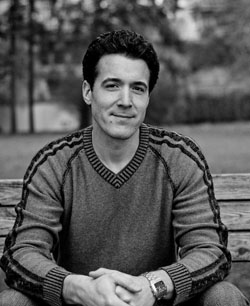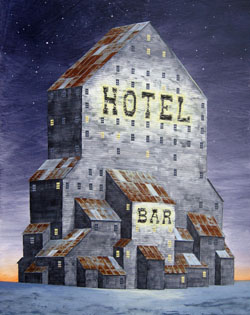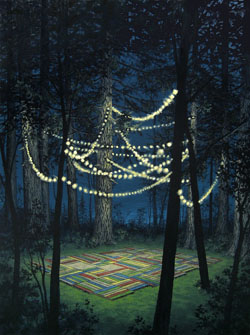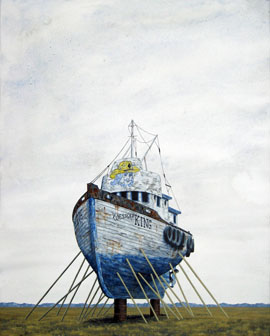Alumni Feature: Jeremy Mangan
Who: Jermey Mangan – Graduated from PLU in 1998 with degrees in fine art and German
 Many SOAC students hope their careers turn out like Jeremy Mangan’s. Currently, he is included in Tacoma Art Museum’s 10th biennial, a group exhibition at Cornish College and a finalist for the prestigious and generous award called the Neddy. He’s the subject of a feature in an upcoming arts and culture publication and preparing to hold his second solo show with the Linda Hodges Gallery in November.
Many SOAC students hope their careers turn out like Jeremy Mangan’s. Currently, he is included in Tacoma Art Museum’s 10th biennial, a group exhibition at Cornish College and a finalist for the prestigious and generous award called the Neddy. He’s the subject of a feature in an upcoming arts and culture publication and preparing to hold his second solo show with the Linda Hodges Gallery in November.
But it wasn’t an accident that Mangan succeeded in living as a full-time artist; it took a lot of hard work, self-motivation and discipline; the road was not devoid of challenges.
Where has life taken you since leaving PLU?
Immediately after graduating from PLU I spent a year as a Fulbright Fellow in painting at the Academy of Fine Arts in Munich, Germany. Next was grad school, first at Central Washington University and then transferring and completing my MFA at Hunter College in New York City. I stuck around New York for a couple years after grad school, working and trying to paint, but mostly just working. I moved back to my native Pacific Northwest five years ago. I returned for many reasons, but one primary reason was to commit completely to making paintings. I live and paint in Fife, WA, and work on-call as an art handler and preparator at Tacoma Art Museum.
How has PLU impacted your professional growth?
 Of the many benefits of my years at PLU, certainly my times studying abroad stand out as some of the greatest. I spent my entire sophomore year studying German language and culture in Freiburg, Germany. It was during that year that I first encountered significant works of Western Art, both in Germany and across Europe. This was, of course, a profound and formative experience, and one that nudged me- shoved me?!- in the direction I now travel. I credit PLU and professor emeritus Rodney Swenson with both my sophomore year abroad, as well as my Fulbright Fellowship. These experiences abroad have proven invaluable to me, both personally and professionally. I couldn’t begin to articulate here all the ways this is true! However, I will say that my times abroad afforded me a more complete picture of the world and my place in it, opened my eyes and imagination to all manner of exciting possibilities, helped me to hone my interests and ambitions, and set the groundwork for the type of work ethic, tenacity, and discipline it takes to be a working artist. And they continue to do these things to this day. Maybe that’s what makes them so great, so influential- those experience never cease to matter, to inform what I do, who I am, what I believe. I carry my time at PLU and in Germany with me everywhere I go.
Of the many benefits of my years at PLU, certainly my times studying abroad stand out as some of the greatest. I spent my entire sophomore year studying German language and culture in Freiburg, Germany. It was during that year that I first encountered significant works of Western Art, both in Germany and across Europe. This was, of course, a profound and formative experience, and one that nudged me- shoved me?!- in the direction I now travel. I credit PLU and professor emeritus Rodney Swenson with both my sophomore year abroad, as well as my Fulbright Fellowship. These experiences abroad have proven invaluable to me, both personally and professionally. I couldn’t begin to articulate here all the ways this is true! However, I will say that my times abroad afforded me a more complete picture of the world and my place in it, opened my eyes and imagination to all manner of exciting possibilities, helped me to hone my interests and ambitions, and set the groundwork for the type of work ethic, tenacity, and discipline it takes to be a working artist. And they continue to do these things to this day. Maybe that’s what makes them so great, so influential- those experience never cease to matter, to inform what I do, who I am, what I believe. I carry my time at PLU and in Germany with me everywhere I go.
What are some of the biggest challenges you faced, and how did you overcome them?
I’ll give you two. The first is the challenge of the “practicality” (or lack thereof) of pursuing the arts as a career. Oftentimes it has seemed at best risky, and at worst foolish and irresponsible. There are certainly more secure, predictable, and conventionally acceptable ways of making a living. Bills have to be paid. So there have been times when the whole thing looks untenable, like it might just not happen. How did I overcome that? Not sure that I did, the Lord simply carried me through. In every one of those moments I can think of how God provided what I needed right when I needed it, whether it be financially or in terms of encouragement or both.
 The second challenge is discipline. Absolutely I love what I do, but it is most definitely work, and I have to battle my laziness. There are plenty of days when I just don’t feel like going into the studio and working, mornings when I’d like to shut off the alarm and sleep a little longer, or afternoons when the sun beckons me outside for a long walk. Or how about a 3-day weekend…? Nobody would know. There’s no boss waiting for me, no coworkers to miss me. The temptation to relent, to relax, is ruthless.
The second challenge is discipline. Absolutely I love what I do, but it is most definitely work, and I have to battle my laziness. There are plenty of days when I just don’t feel like going into the studio and working, mornings when I’d like to shut off the alarm and sleep a little longer, or afternoons when the sun beckons me outside for a long walk. Or how about a 3-day weekend…? Nobody would know. There’s no boss waiting for me, no coworkers to miss me. The temptation to relent, to relax, is ruthless.
I combat that by reminding myself of my definition of professionalism: It’s doing the thing I’ve decided and set out to do to the best of my abilities, regardless of how I feel about it at any given moment. What matters is how I feel about it in the broadest sense- in terms of the proposition of being a working artist- and that is something I deeply want, something I feel called to, and something I feel like doing, all the time. If I couch my motivations in that broader, big-picture sense, I can almost always recover the motivation to get to work. What’s more, once I’ve done this and begun working for the day, I find that, without even noticing, I’m suddenly back in that place of enjoying myself, of wanting to work right there in the moment. So it’s a matter of order: It’s no good to simply wait for motivation to well up, and then work out of that motivation. Most of the time I just have to start working, and then, as a wonderful by-product, the motivation arrives!
What are some of the experiences that have defined your work?
One thing I’ve learned with absolute certainty along the way is that every experience defines the work. Of course some more than others, but everything an artist makes is a self-portrait. There’s no way around it. We’re all compelled to put “form”- in whatever discipline or media- to something we hold as true but can’t articulate any other way. Any genuine, rigorous art-making impulse and motion must come from the deepest humanity the artist can muster. The work is a means to get at that very thing…
But having said that, I guess it’s no surprise that it’s always the extreme experiences that are most informative, because they are the most significant: those that are the most joyful, beautiful, pleasant, and then those that are the most difficult, sad, painful. Or, more profound and meaningful yet might be those that are both extremes at once! My times away from home fall into that category- the two years in Germany, and the nearly five in New York City.
 No question growing up in the Pacific Northwest in particular, and the American West in general, have greatly defined my work. I’m fortunate to be extremely fond of the place I’m from. The mountains, waters, trees, and even vast horizons east of the mountains have always been dear to me and important to the work. Other art of any discipline greatly informs my work, as well- whether film, music, other painters… Seeing the contents of so many museums and galleries in New York, Europe, and the Middle and Far East have been wonderful. Any travel I do always proves significant and useful. Above all is my faith in, and relationship with, Jesus Christ.
No question growing up in the Pacific Northwest in particular, and the American West in general, have greatly defined my work. I’m fortunate to be extremely fond of the place I’m from. The mountains, waters, trees, and even vast horizons east of the mountains have always been dear to me and important to the work. Other art of any discipline greatly informs my work, as well- whether film, music, other painters… Seeing the contents of so many museums and galleries in New York, Europe, and the Middle and Far East have been wonderful. Any travel I do always proves significant and useful. Above all is my faith in, and relationship with, Jesus Christ.
What is some of the best advice you could give to an undergrad pursuing a career in the arts?
Unless you’re spectacularly good or spectacularly lucky, it’s very likely going to be as hard as everyone says it is. So be prepared. It’s a tremendous amount of work, and oftentimes unrewarded work. Please take some real time to consider what you may be getting yourself into. Also, be very careful about committing large amounts of money to schooling. I know quite a few people who took out large loans for undergrad and/or grad school, and they’re crippled by them as artists. They have to work a job to pay them off, and they’re not making art anymore. Then they settle into the comforts of a steady paycheck and they stop outright- maybe for good.
So, know that it’s a high risk, high reward proposition. However, if you’ve done the soul- searching and you feel called, know that it can be done and go after it with all your might!
And, again, it can be very high reward! It’s a great privilege and blessing to be an artist, to create daily.
To learn more about Jeremy Mangan and view his work, visit his website at: http://www.jeremymangan.com/



Social Media